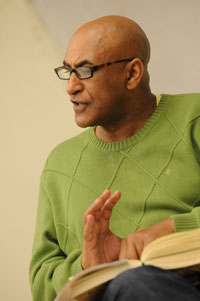
Phil Farnsworth
Teodros Kiros
For media inquiries, please contact Media Relations
Teodros Kiros is considered a leading authority on moral philosophy and a leading voice in African philosophy. He is a professor of philosophy at Harvard's summer school, has been a W. E. B. Du Bois Fellow at Harvard University for the past 20 years, and has been nominated three times for Berklee's Distinguished Faculty Award.
Kiros is the producer and host of the internationally acclaimed television program African Ascent, which continually gives visibility to Berklee faculty and includes interviews with President Roger H. Brown and Provost Larry Simpson. He is also an essayist for leading websites and has published hundreds of articles in refereed journals and online. He's also a columnist for leading newspapers.
- Philosopher and novelist
- Has had short stories and an excerpt from his forthcoming novel, Cambridge Days, featured on Bridgeportword.com
- Author and/or editor of over 200 articles and reviews in referred journals, magazines, and prestigious websites; encyclopedias; and 23 books including Towards the Construction of Political Action; Moral Philosophy and Development; Self-Construction and the Formation of Human Values: Truth, Language and Desire; Explorations in African Political Thought; Multiculturalism; Zara Yacob: Rationality of the Human Heart; Philosophical Essays; Ethiopian Discourse; Hirut and Hailu and Other Short Stories; Cambridge Days; and the forthcoming Self-Definition: A Philosophical Inquiry from the Global South and Global North (2019); Conversations with Cornel West, Africa World Press (2023); and Cardio Centrism and The Rationality of the Human Heart, Lexington Press (2024)
- W. E. B. Du Bois Fellow at Harvard University
- Executive producer and host of the television program African Ascent
- Winner of the 1999 Michael Harrington Book Award—Author for Self-Construction and the Formation of Human Values: Truth, Language, and Desire
